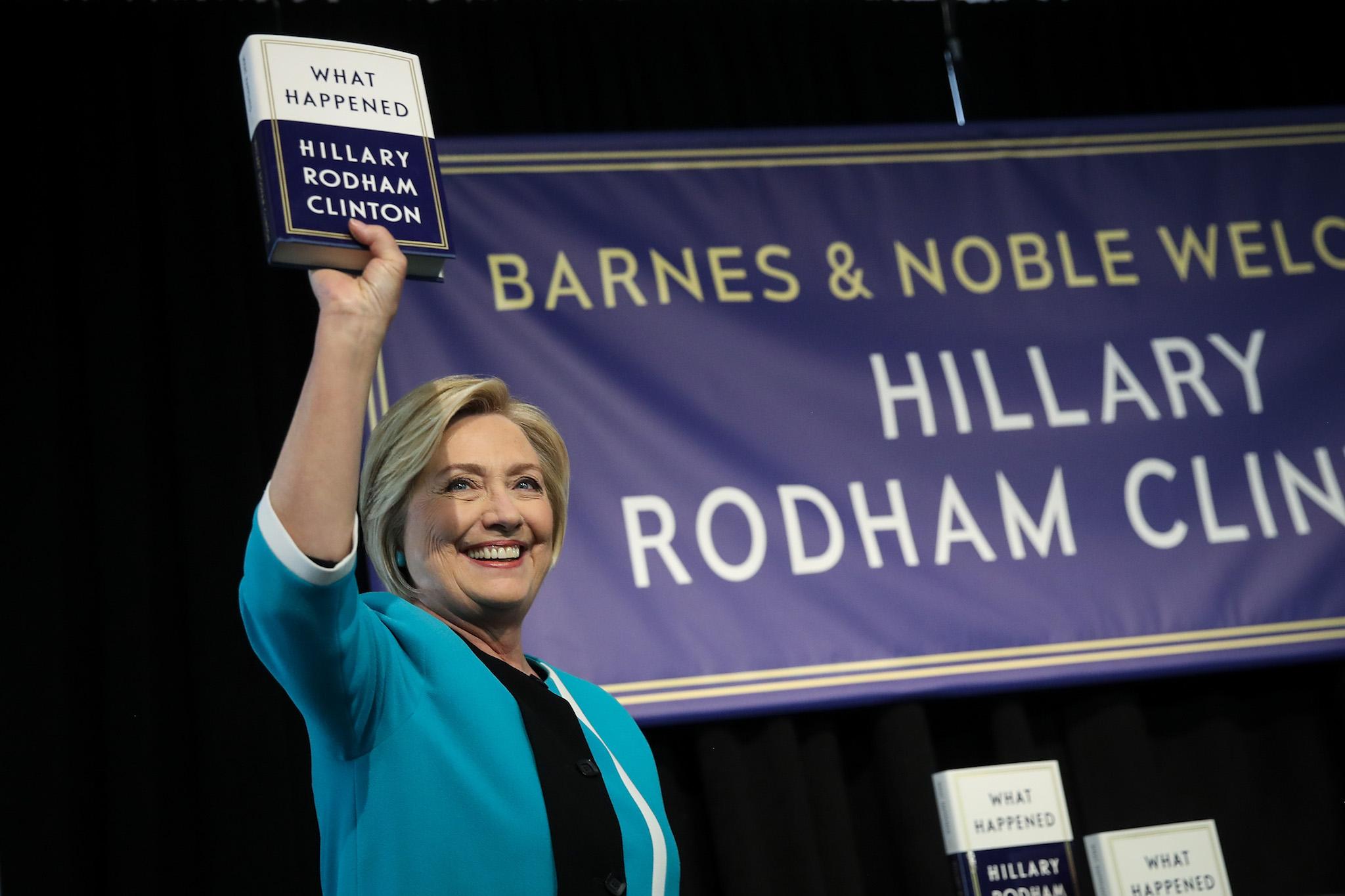Hillary Clinton thinks the news media was unfair to her during the US Presidential election. She’s right
Defeated Democratic candidate attacks campaign press coverage in new memoir What Happened

Your support helps us to tell the story
From reproductive rights to climate change to Big Tech, The Independent is on the ground when the story is developing. Whether it's investigating the financials of Elon Musk's pro-Trump PAC or producing our latest documentary, 'The A Word', which shines a light on the American women fighting for reproductive rights, we know how important it is to parse out the facts from the messaging.
At such a critical moment in US history, we need reporters on the ground. Your donation allows us to keep sending journalists to speak to both sides of the story.
The Independent is trusted by Americans across the entire political spectrum. And unlike many other quality news outlets, we choose not to lock Americans out of our reporting and analysis with paywalls. We believe quality journalism should be available to everyone, paid for by those who can afford it.
Your support makes all the difference.We'll never know how Hillary Clinton would have performed as President.
But now we know what kind of media critic she'd be: a tough one.
In What Happened, her book about the 2016 campaign, Clinton lets the news media have it.
While she stops well short of blaming news coverage for her loss to Donald Trump, she sees it as one of the many ill winds that whipped up a perfectly awful storm.
She makes a convincing case that coverage of her email practices as Secretary of State was way over the top.
“None of Donald Trump's scandals... generated the kind of sustained, campaign-defining coverage that my emails did,” Clinton wrote in her instant bestseller.
She dings the press for its failure to focus on substance, and for giving Trump far too much uncritical exposure during the primary season.
It's all true, though Clinton must share in the blame because she failed to do what successful candidates must: generate news, drive home a clear message and provide at least some measure of excitement.
Clinton herself acknowledges the charisma gap: “You've got to give it to Trump - he's hateful but it's hard to look away from him.”
Mostly, she complains about the way the press tried to even up the vastly different flaws of the two candidates.
“If Trump ripped the shirt off someone at a rally and a button fell off my jacket on the same day,” the headlines would put it this way: “Trump and Clinton Experience Wardrobe Malfunctions, Campaigns in Turmoil.”
Clinton did get a raw deal from the press, which largely ignored her on serious policy and allowed Trump to frame the coverage.
The campaign exposed the worst characteristics of the media - its addiction to the sensational, its propensity for overkill, and its profit-driven desire for clicks and ratings.
As a Harvard study noted, the major TV networks gave 220 minutes to policy in 2008. In 2012, it was 114 minutes. In 2016, it was 32 minutes.
The email story, by contrast, got 100 minutes of airtime.
Given that this helped put a narcissistic reality TV star with no governing experience in the Oval Office, some soul-searching is in order.
Is that happening? There's precious little evidence.
Pilloried at a post-election gathering at Harvard, CNN chief Jeff Zucker used an annoying logical fallacy to defend his network.
“Half the people want to blame us for Trump, and half the people want to say that we're terrible to Trump,” Zucker said. “That's how I always think we're doing the right thing.” (That's not necessarily so, and isn't in this case.)
In a recent interview, Chuck Todd of NBC was asked whether he was satisfied with the campaign coverage he directed. There are always lessons to learn, he said, and then paraphrased Donald Rumsfeld: “You cover the campaign that's in front of you. You don't get to cover the campaign you want.”
What about The New York Times, with which Clinton has a love-hate relationship? She points an accusing finger at the Times, especially for its obsession with the email story it first broke.
After the election, the publisher Arthur Sulzberger Jr sent a letter to Times readers vowing more attention to parts of the nation that are sometimes ignored. Trump insists on calling the letter an apology, though it isn't.
But that didn't address Clinton's beefs, so I asked Carolyn Ryan, who directed the Times' politics coverage, whether a postmortem examination took place.
“That kind of self-examination and review of coverage is something we engage in all the time and have done so after this election,” she said. That review has focused on polling, the need to get outside New York more, data use and how to highlight issue coverage, she said, but she declined to get into detail about whether it addressed Clinton's complaints.
The Times columnist David Leonhardt - a former Washington bureau chief - did offer a tough assessment of the media's over-hyped coverage of the hacked Democratic National Committee emails and the “obsession” with Clinton's private server.
By contrast, CBS president David Rhodes, in an interview with former Face the Nation host Bob Schieffer, seemed sanguine: “There's always a blame-the-media phase of any campaign.”
In the meantime, the occupant of the Oval Office constantly undermines the reality-based press, which helped put him there. Just last week, Trump again sounded like an authoritarian leader as he called on Congress to investigate journalists for reporting the news.
Maybe some serious self-scrutiny is being done behind closed doors in editorial offices, with no desire to talk about it publicly.
I hope so, because, as Clinton's book points out, there are real lessons here - and all-too-real consequences.
The Washington Post
Join our commenting forum
Join thought-provoking conversations, follow other Independent readers and see their replies
Comments